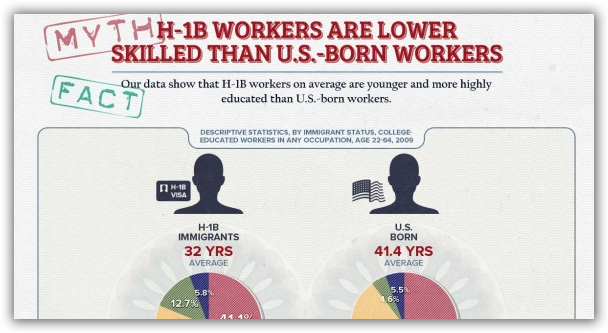aNewDomain.net— For Apple it’s easy to outsource low-tech work to such offshore entities and product mills as Foxconn. That just creates fast production lines in China. But what about insourcing highly-skilled work? Even Apple is doing it now as it brings more work back to the United States.
The future of tech rests with the U.S. Congress right now. It needs to make a wise call on H-1B visas. That’s because there is demand for highly-skilled and innovative manpower. The visas are key to a long-term start-up strategy.
Indians, Chinese, British and Israelis many times form the core of research and development labs in the San Francisco Bay area. These workers create new entrepreneurial trends. Consider: Russian immigration to Israel was a pivotal factor in making high-tech business in Israel so vibrant. The level of mathematics in a Russian high school education gives young people the right start for solving programming challenges that Israel and other countrys’ start-ups later rely upon.
The U.S. needs to create a similar algorithm. We need to add computer programming and other high-tech skills into K-12 educational curriculums. Until that happens — and as the number of U.S.-educated engineers continues to remain low — insourcing is a great option.
Green cards for the best and the brightest of the global creative class at large will ensure the future of United States technology. International tech will benefit as a result of this as well. Canadian and European tech hubs are waiting to grab the applicants for American visas.
That’s the secret sauce for creativity in the valley: multi-national diversity. Twentieth century immigration rules no longer apply to the web economy, nor should they.
It’s a myth that H-1B visa-carrying workers are less skilled than U.S. workers. Just the reverse is true. Check out this infographic. And scroll below the fold to check out a great show from PBS on the issue and an infographic on the insourcing trend, coming to a tech company near you.
It’s a myth that H-1B visa carrying workers are less skilled than U.S. workers. Just the reverse is true. Check out this infographic.
From the PBS NewsHour on whether highly-skilled “guest” workers spark the economy. Great stuff here.
Watch Highly Skilled Guest Workers Could Help Tech-Driven Economy? on PBS. See more from PBS NewsHour.
For aNewDomain.net, I’m David Michalis.
Based in Australia, David Michaelis ia an award-winning international journalist, founder of Link TV and veteran of such news agencies as the BBC. He’s on the global beat here at aNewDomain.net.















I can attest to this personally. When I first started at Google, a number of my colleagues were from India and China on H-1B Visas.
To make it to a job at Google in the U.S. literally they passed many many tests and gauntlets to vet out the best of the best. Hundreds and thousands of students compete and only a few make it to IIT (The MIT of India) or the Chinese equivalent.
So each employee was the best of the best of the best. And when a new opening is being screened, I would see that most of the American applicants did not have the skills to execute the work.
And I did not blame Google for this, or India, or China. I blamed America. Represent. Work. Chose the hard path instead of the easy way. Earn it.
When everything is given to you, it makes it tough to compete in a meritocracy.
True, Richard Hay. At Google, this has got to be a hot button issue.